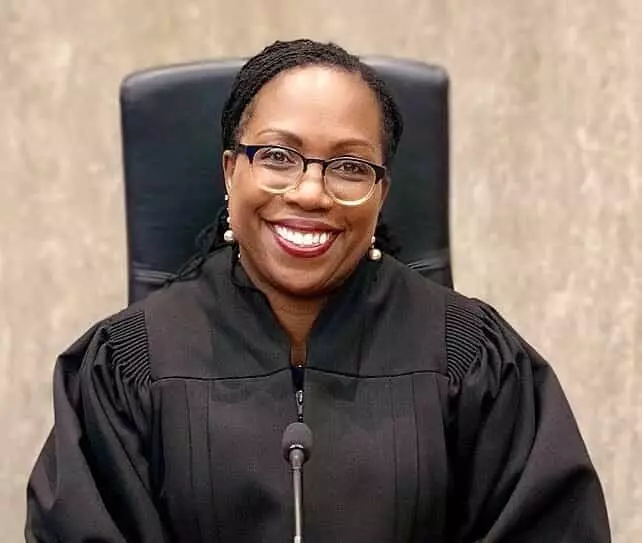
Ketanji Brown Jackson is an attorney and federal judge. Recently, she was nominated to a seat on the Supreme Court of the United States, a seat that will be left vacant by the man that she once clerked under, Justice Stephen Breyer. Jackson is the first African American woman to be nominated to sit on the bench. She was expected to be on the list of Biden Administration potential Supreme Court nominees, and her time as a public defender has drawn praise from progressives in Washington.
| Celebrated Name: | Ketanji Brown Jackson |
| Real Name/Full Name: | Ketanji Onyika Brown Jackson |
| Gender: | Female |
| Age: | 51 |
| Birthdate: | September 14, 1970 |
| Birthplace: | Washington, DC |
| Nationality: | American |
| Height: | 5 ft. 1 in. |
| Weight: | 108 lb. |
| Sexual Orientation: | Straight |
| Marital Status: | Married |
| Husband/Spouse | Dr. Patrick G. Jackson |
| Children/Kids: | Two daughters – Talia and Leila |
| Dating/Boyfriend Name: | N/A |
| Is Ketanji Brown Jackson Gay? | No |
| Highest Political Office: | United States Court of Appeals for the District of Columbia Circuit, United States Supreme Court Nominee |
| Profession: | Attorney and Jurist |
| Colleges Attended: | Harvard |
| Degrees: | Bachelor’s – Government; Juris Doctor |
| Salary: | median salary of DC Circuit – $64,184 |
| Net Worth in 2021: | $2 million – $5 million |
Biography: Early Life and Family
Ketanji Brown Jackson’s life appears to have come full circle. Her birthplace is Washington, DC, where she currently resides and works as a judge on the U.S. Court of Appeals (District of Columbia Circuit).
Jackson was always very studious, a trait she inherited from both parents. Her father was in law school when Ketanji was very young. She remembers sitting with him and coloring while her father studied for his law degree. Her mother was also a huge proponent of education; she was the principal of a high school in Miami, Florida where Ketanji grew up.
Ketanji participated in many extracurricular activities as a high school student, with a particular talent for debate and speech. She won a major debate in the National Catholic Forensic League Championships. Ketanji always knew she wanted a career in law. She predicted in her high school year book that some day she’d be appointed to the Supreme Court.
Ketanji attended Harvard University, where she earned a Bachelor’s degree in Government. Once again, she participated in a number of activities in addition to her schoolwork, including dramatic performances. She graduated with magna cum laude honors. She took a year off to work for Time magazine, but returned to Harvard Law School for her Juris Doctor. She obtained this degree with honors as well.

Personal Life
Ketanji married Patrick G. Jackson in 1996, and together, the couple have two daughters – Talia and Leila.
The Jacksons have been described as an unlikely pair. They met while both were students at Harvard. Her concentration of study was law; his was medicine and mathematics (Dr. Jackson is a gastrointestinal surgeon). Sources say that Patrick was Ketanji’s first “serious” boyfriend, and the pair married after six years of courtship.
Age, Height, and Weight
Ketanji Brown Jackson is 51 years of age. She is 5′ 1″ in height, and she weighs an estimated 108 lbs.
Net Worth
Ketanji Brown Jackson’s net worth estimated between $2 million and $5 million. She obtained her wealth through a successful legal career, working in a private practice.
Career Outside of Politics
Ketanji Brown Jackson has served in private practice a few times in her legal career, but she is known for her time as a public defender, for time spent on the sentencing commission, and for her time as a jurist.
Jackson clerked for two different individuals between 1996 and 1998. Both judges worked in some type of district court; one in Massachusetts, and the other in Washington. Before doing further work as a clerk – this time under Justice Stephen Breyer – Jackson worked at a private firm, Miller, Cassidy, Larroca & Lewin, in Washington, DC. Jackson clerked for Breyer, whom she will be replacing, during his time as a Supreme Court Justice.
Once Jackson completed clerking under Justice Breyer, she again went into private practice. Between 2000 and 2002, she worked in Boston at Goodwin Procter (law firm). In 2002, she left this firm to work at the Feinberg Group. She would work at the firm for one year.
Jackson would then work for the United States Sentencing Commission as a special counsel. The Commission is an independent agency of the United States federal judicial branch. The Commission interprets Federal Sentencing Guidelines. The Commission was created as a part of the Sentencing Reform Act.
Ketanji has been praised as a choice for the Supreme Court’s upcoming vacant position as she has a more hands-on understanding of the American justice system due to her time as a public defender. However, it is important to understand that Jackson wasn’t a public defender in the sense that most Americans might understand. She was a federal public defender, and one of her most notable cases was defending an individual who had been detained at Guantanamo Bay.
The Washington Post commented on her time as a public defender: “she won uncommon victories against the government that shortened or erased lengthy prison terms.” Other sources say Jackson “has shown a deep interest in trying to ensure fair processes for often unpopular clients.”
Jackson would work at yet another private firm before beginning her career as a jurist. She took a job at Morrison and Foerster, where she worked between 2007 and 2010. Here, she still worked defending individuals imprisoned at Guantanamo Bay. Chiefly, as an appellate specialist, she wrote amicus briefs on behalf of her clients.
Jackson has said that most of her clients were corporations, corporation executives, or non-profit organizations. Senator Tom Cotton is said to have questioned her during her last Senate confirmation hearing when she was nominated for her current position on the U.S. Court of Appeals in Washington, DC; he asked questions regarding her time as a public defender and her clients, whom some have described as terrorists. Jackson answered that yes, she had defended a terrorist by the name of Khi Ali Gul. Gul is said to have procured items to carry out an attack on an American base in Salerno.

Career in Politics
Jackson’s nomination by then-President Barack Obama to the United States Sentencing Commission could be considered her first venture into a political position as she had to be confirmed by the Senate as a federal judge or Supreme Court justice would be. She was unanimously confirmed to the Sentencing Commission in 2010.
One of her most notable accomplishments while working as special counsel for the United States Sentencing Commission was to change the guidelines for sentencing someone found with a crack cocaine offense.
By 2012, Obama had tapped Ketanji Brown Jackson for a different type of federal job. This time, he would nominate her to a jurist position for the United States District Court for the District of Columbia. At the time of her confirmation hearings, Representative Paul Ryan, who is related to Ketanji Brown Jackson via her husband and knew her personally, said: “Our politics may differ, but my praise for Ketanji’s intellect, for her character, for her integrity, it is unequivocal.”
Obama had nominated Ketanji Brown Jackson for this position in December 2012, and she was confirmed by March 2013. Justice Breyer, her former mentor, swore her in to office.
During Jackson’s time on the District Court, she was noted for multiple decisions in which she made decisions against the Trump Administration. She found that one of President Trump’s White House counsel (formerly) must answer a subpoena to appear before Congress. In her opinion, Ketanji Brown Jackson wrote the now-famous statement: “Presidents are not kings.” Other cases on which she ruled had to do with political issues, and she presided over many administrative law questions.
Her court rulings were not without controversy. One publication, Bloomberg Law noted in 2021 that conservatives were quick to point out a number of Jackson’s rulings that were eventually reversed; some believed these reversals could be “a blemish on her record.” It is likely those decisions will be mentioned during her upcoming Supreme Court confirmation hearings; however, because Jackson has been twice confirmed by the Senate previously – and she has no true controversies sitting on her professional or private doorstep – Jackson is likely to be confirmed once more.
Some critics say that Jackson has been highly political, particularly in her Trump-era rulings. On decision in 2019 said that three different Trump executive orders “conflicted with federal employee rights to collective bargaining.” This decision was unanimously reversed by the D.C. Circuit Court. Another Trump court case had to do with Homeland Security and deportation. Her decision was, once again, reversed unanimously.
However, some very prominent progressives claim that of the 600 or so decisions made by Ketanji Brown Jackson, only about twelve of those opinions have been overturned.
In one case, Jackson ruled that officials in a jail failed to accommodate a deaf man while he was incarcerated, which those who would like to see criminal reform are likely to utilize as a clapping point for Jackson’s confirmation hearings. In another case, she dismissed forty wrongful death suits against Malaysia Airlines, saying the hearings should be held in Malaysia, not the United States. This ruling was confirmed by the D.C. Circuit Court.
President Joe Biden would announce Ketanji Brown Jackson’s nomination to the U.S. Court of Appeals for the D.C. Circuit in 2021. She has been in this position since June 2021.
Many individuals see Ketanji Brown Jackson as a jurist who is likely to be “left-leaning.” When confirmed to her appellate court position in June 2021, she was questioned about the Trump Administration rulings as well as those that were reversed, ironically, by the very court she would be sitting on as an appellate judge. NBC News’ Sahil Kapur says, “Jackson fits well with the Democratic Party and the progressive movement’s agenda.” Kapur pointed to Jackson’s background as a public defender and her “labor-friendly” rulings on the DC Circuit Court as evidence.
Politico has said, “Jackson is popular with liberal legal activists . . (she is) willing to engage in ideological combat with the court’s conservatives.”
Regardless of political leanings, Jackson’s record is virtually spotless; her nomination is likely to be confirmed, making her the first African American female Supreme Court Justice.





